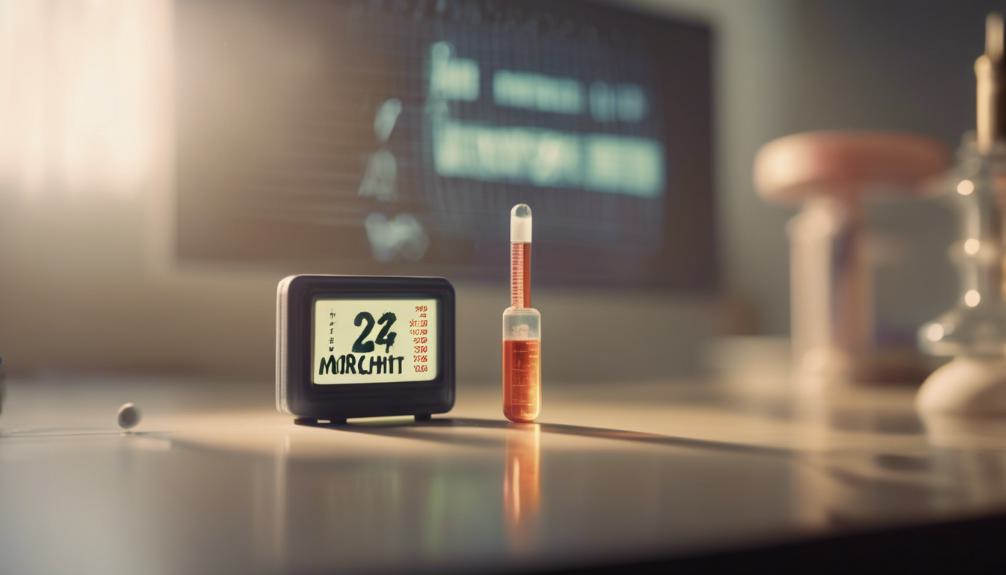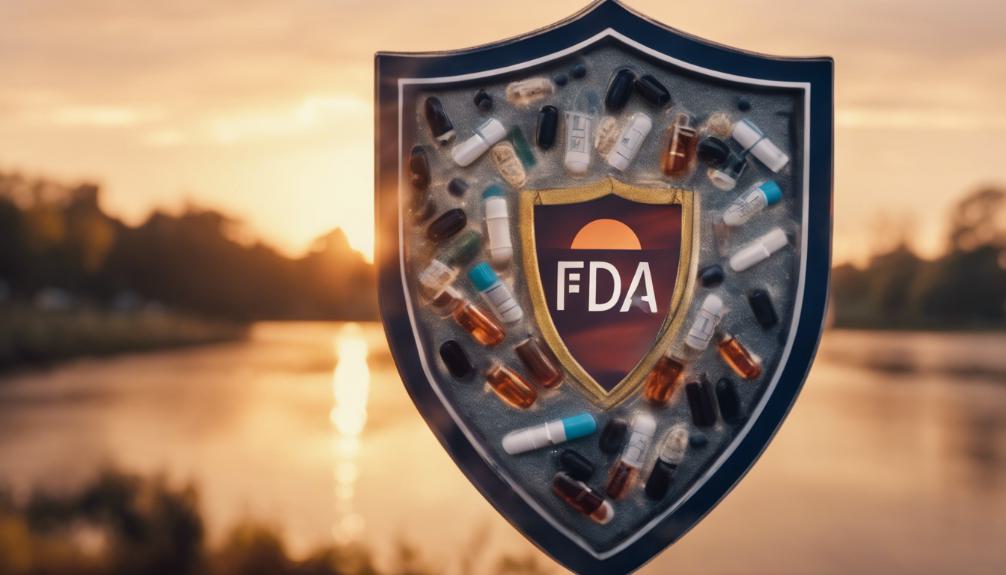FDA News March 2024
As we navigate the vast ocean of healthcare, the FDA News for March 2024 serves as both a lighthouse and a compass, guiding us through the murky waters of medical regulations and safety alerts. Our collective attention is particularly drawn to the pressing issue of lead contamination in certain cinnamon brands—a matter that underscores the ongoing challenges in ensuring food safety and protecting public health. Equally compelling are the breakthroughs in cancer therapy and rare disease drug approvals, signaling a beacon of hope for patients awaiting revolutionary treatments. Let's engage in a thoughtful conversation about these developments and their broader implications for our healthcare landscape.

Key Takeaways
- FDA recalls cinnamon brands for lead contamination, urging consumers to discard affected products.
- Groundbreaking cancer and diabetes therapies receive FDA approval, promising enhanced patient care.
- New FDA dietary supplement regulations enforce stricter safety and quality measures.
- Dollar Tree and Family Dollar remove contaminated cinnamon, highlighting consumer safety efforts.
Lead Contamination Alert

We've been alerted to a concerning lead contamination issue involving ground cinnamon from brands like La Fiesta, Marcum, MK, Swad, Supreme Tradition, and El Chilar, which have been found to contain harmful levels of lead. Specifically, these products have shown to contain 2.03 to 3.4 parts per million of lead, surpassing what's considered safe. The FDA has taken swift action by issuing voluntary recalls for these affected cinnamon products to mitigate the potential for lead exposure, particularly among children who are at a heightened risk of health complications from lead ingestion.
Prolonged consumption of these tainted spices can pose significant health risks, including developmental issues in children and various health problems in adults. Despite no illnesses being reported thus far, the risk remains substantial, prompting advisories for consumers to avoid purchasing these products. Additionally, anyone who currently has these ground cinnamon products at home is strongly advised to discard them immediately to prevent any potential lead exposure.
The situation underscores the importance of diligent oversight by the FDA and the need for consumers to stay informed about the safety of their food products to protect their health and that of their families.
Revolutionary Treatment Approvals

As we move on to discussing revolutionary treatment approvals, it's clear that the FDA's recent decisions are set to change lives. They've given the green light to groundbreaking therapies for cancer and innovative approaches to managing diabetes. These advancements represent a significant leap forward in patient care and treatment options.
Breakthrough Cancer Therapy
In a landmark achievement, the FDA's recent approval of a groundbreaking cancer therapy offers new hope to patients battling advanced forms of the disease. This revolutionary treatment, which precisely targets specific cancer cells while minimizing damage to healthy tissues, has reshaped the landscape of cancer care. We've witnessed firsthand the remarkable improvements in patients enrolled in clinical trials, underscoring the therapy's efficacy and potential to save lives. The FDA's endorsement of this innovative approach marks a pivotal moment, greatly broadening treatment options for those facing this formidable challenge. It's a proof to the strides we're making in oncology, and we're optimistic about the future it heralds for cancer patients everywhere.
Novel Diabetes Management
The FDA's recent approval of a cutting-edge implantable device has revolutionized diabetes management, offering a beacon of hope for patients seeking improved glycemic control and quality of life. This device, a marvel in the field of medical technology, seamlessly combines continuous glucose monitoring with insulin delivery capabilities. It's designed to tackle the challenges of elevated levels of glucose, providing a significant leap in personalized treatment options. By harnessing real-time glucose data, patients now have the power to manage their health more effectively, experiencing fewer episodes of hypoglycemia. This advancement represents a critical step forward by the Food and Drug Administration in improving products available for diabetes patients. It's a confirmation of the ongoing commitment to enhancing health outcomes and the quality of life for those battling this condition.
New Dietary Supplement Regulations

We're seeing a significant shift with the introduction of stricter FDA regulations aimed at enhancing the safety and quality of dietary supplements. The Food and Drug Administration (FDA) is taking a firm stance to guarantee products like cinnamon, which are commonly consumed for their health benefits, are safe from contaminants such as elevated levels of lead. This move is a significant part of the broader effort to enforce accurate labeling, ingredient transparency, and adherence to good manufacturing practices across the board.
Manufacturers now face the requirement to rigorously test and verify the purity and potency of their products, making sure they're free from harmful adulterants and contaminants. This is a critical step toward protecting consumers from misbranded products that might pose serious health risks. With these new regulations, we're expecting a noticeable improvement in quality control measures within the dietary supplement industry.
It's clear that the FDA's enhanced oversight is designed to foster a safer environment for consumers, making sure that when they choose a dietary supplement, they're getting exactly what the label promises, without any unwanted surprises. This heightened focus on safety and quality is a welcome change for all of us looking for safer, more reliable dietary supplement options.
Enhanced Consumer Safety Measures

Building on our commitment to dietary supplement safety, it's time to examine the FDA's enhanced consumer safety measures. Recently, a significant concern emerged with the discovery of elevated blood lead levels in ground cinnamon products from brands such as La Fiesta, Marcum, and Supreme Tradition. This alarming finding prompted immediate action to protect consumers.
Dollar Tree and Family Dollar, recognizing the importance of these safety measures, voluntarily removed the affected ground cinnamon from their shelves. It's a critical step forward in ensuring the health and safety of consumers nationwide. While no illnesses have been reported in connection with the tainted products, it's a stark reminder of the importance of preventive measures.
We're urging consumers who may have purchased these contaminated products to discard them immediately. Avoiding the purchase of recalled products is essential to safeguard against potential lead exposure. The FDA is reinforcing its commitment to consumer safety by issuing recommendations for manufacturers, processors, and distributors. These guidelines aim to prevent future contamination incidents, ensuring that the food supply remains safe and secure for all.
Breakthrough in Cancer Therapy

In an exciting advancement, a new drug-coated balloon has been FDA-approved for treating coronary artery disease, marking a significant breakthrough in cancer therapy. The FDA's approval of this innovative device signals a pivotal moment in the evolution of treatment options available to patients. We're witnessing a promising approach that marries the treatment of coronary artery disease with cancer therapy, offering a dual-front attack that could potentially reduce risks associated with traditional methods.
This drug-coated balloon represents not just an advanced treatment option but a leap forward in our ongoing battle against these life-threatening conditions. Patients suffering from coronary artery disease can now look forward to a treatment that is not only cutting-edge but also bears the promise of enhanced efficacy and safety. The introduction of this device into the market is a clear indication of the relentless pursuit of excellence in patient care and outcomes.
We're excited about the possibilities this breakthrough brings to the table. It's a clear indication of progress in our collective effort to improve the lives of those affected by cancer and coronary artery disease. As we move forward, the focus remains on harnessing such innovative technologies to continue enhancing patient care and outcomes.
Updated Vaccine Guidelines

Responding to the rising concern over measles outbreaks, the FDA has updated its vaccine guidelines to underscore the critical role of immunization in preventing this disease. The FDA's move is a decisive step toward bolstering measles prevention efforts nationwide. By emphasizing the importance of using FDA-approved vaccines, the updated guidelines serve as a beacon for healthcare providers, guiding them in their quest to protect communities from this highly contagious disease.
We're entering an important phase where vaccination is more essential than ever. The FDA's updated guidelines are a clear message: vaccination is key in reducing the risk of measles outbreaks. It's not just about individual protection; it's about safeguarding public health. The aim is to significantly increase public awareness about the benefits of measles vaccination. By doing so, we're not just fighting against measles; we're promoting a healthier future for everyone.
Healthcare providers are now encouraged more than ever to follow these updated vaccine guidelines. It's our collective responsibility to make sure that our communities are informed and protected. With the FDA's renewed focus on measles prevention through vaccination, we're stepping up our defense against potential outbreaks and making sure that public health remains a top priority.
Stricter Food Labeling Standards

After discussing the importance of vaccination updates, we'll now focus on the FDA's move to implement stricter food labeling standards, aiming to enhance consumer safety and awareness. It's a significant step forward in ensuring the wellbeing of consumers across the nation. The FDA's initiative to revamp food labeling standards is not just about adhering to regulations; it's about empowering us to make healthier, more informed choices.
These new standards are set to provide clear, accurate information on food products, spotlighting ingredients, nutritional content, and potential allergens. It's a game-changer for those of us looking to navigate our diets more carefully, especially for those with specific dietary needs or allergies. The transparency in labeling means no more guessing games about what's in our food or being misled by vague claims.
In addition, food manufacturers will need to step up their game to comply with these updated requirements. The focus on safety and consumer awareness is a proof of the FDA's commitment to improving public health. Stricter food labeling is a proactive approach to tackle misleading information head-on, paving the way for a healthier future for all of us.
Medical Device Innovation Boost

We're now turning our attention to the significant advancements in medical device innovation, thanks to the FDA's latest regulatory updates. These changes not only pave the way for cutting-edge device developments but also streamline the regulatory pathway, making it more efficient for manufacturers. The impact on the healthcare sector is expected to be profound, enhancing the quality and safety of medical devices for patients.
Cutting-edge Device Developments
The FDA's recent spotlight on cutting-edge medical device developments marks a significant push towards innovating healthcare solutions. By emphasizing advancements in medical devices, the FDA is driving the healthcare industry towards improved patient outcomes and broader treatment options. These innovative technologies not only enhance precision and effectiveness but also prioritize patient safety. It's clear that the FDA's focus on device innovation is crucial for the evolution of healthcare practices and standards. We're seeing an encouragement of efforts to develop groundbreaking medical devices aimed at addressing a variety of medical conditions and procedures. This initiative not only supports the healthcare industry's growth but guarantees that patient care continues to become more efficient, safe, and effective.
Regulatory Pathway Enhancements
In a bid to accelerate medical device innovation, the FDA is enhancing regulatory pathways, streamlining the approval process to bring new technologies to market more efficiently. These enhancements include reclassifying most in vitro diagnostics from class III to class II, greatly simplifying the path to market clearance through the 510(k) pathway. We're encouraged by the FDA's initiative, which aims to reduce the time and resources needed to navigate regulatory requirements. By doing so, manufacturers must stay abreast of changes and closely monitor CDRH progress to adhere to the updated requirements effectively. This move not only benefits the medical device industry but also promises to bring innovative solutions to healthcare professionals and patients much quicker.
Impact on Healthcare Sector
Shifting focus to the healthcare sector, FDA's regulatory enhancements greatly boost medical device innovation, offering promising implications for both providers and patients. By reclassifying most in vitro diagnostics from class III to class II, the FDA Administration streamlines the path for new devices to be sold in the market. This change, encouraging the development of infectious disease and companion diagnostic tests, fosters competition and improves accessibility to cutting-edge medical technologies. Manufacturers now, more than ever, are advised to keep an eye on CDRH progress and adapt to the evolving 510(k) requirements to leverage this streamlined pathway. This initiative not only elevates the levels of medical device innovation but also ensures that healthcare providers and patients benefit from improved diagnostic capabilities, akin to discovering valuable cinnamon products in discount stores, enriching our healthcare landscape.
Opioid Crisis Response Strengthened

We're taking decisive steps to combat the opioid crisis by implementing new strategies aimed at prevention and treatment. The Drug Administration on Wednesday announced a thorough plan that zeroes in on these critical areas. Our focus is not just on managing this crisis but on turning the tide through effective prevention and innovative treatment solutions.
By expanding access to medication-assisted treatment and overdose-reversal drugs, we're addressing the immediate needs of those affected. It's important that these lifesaving interventions become more readily available to communities nationwide. In addition, our collaboration with stakeholders to refine opioid prescribing guidelines is a proactive measure to prevent misuse before it starts.
Education is another pillar of our strategy. We're emphasizing the importance of patient education, ensuring individuals are fully informed about their medications. Additionally, provider training is being ramped up, equipping healthcare professionals with the knowledge and tools they need to make safer prescribing decisions.
Community support programs are also being enhanced, offering a network of resources for those impacted by the opioids crisis. Our administration is committed to these efforts, aiming to reduce opioid-related fatalities and improve public health outcomes.
Digital Health Advancements

Harnessing the power of technology, we're launching the FDA Digital Health Center of Excellence to pioneer advancements in healthcare through digital innovation. This initiative marks a significant step toward integrating digital tools with health innovation, ultimately streamlining regulatory processes for quicker, more efficient development and approval of digital health products. By focusing on the use of AI/ML in medical devices, we're not only enhancing the capabilities and functionalities of these technologies but also ensuring they meet our rigorous safety and efficacy standards.
Our commitment extends beyond just the development of new technologies. We're also concentrating on the generation of real-world evidence and bolstering cybersecurity measures to protect patient data. Through these efforts, we aim to create a more dynamic regulatory environment that can adapt to the rapid pace of innovation in the digital health sector.
Collaboration is key to our approach. By working closely with stakeholders, we're setting the stage for a future where digital health tools are more accessible, reliable, and effective. This is not just about pioneering new technologies but also about reshaping the landscape of healthcare delivery for the better.
Rare Disease Drug Breakthroughs

In our pursuit of medical innovation, significant strides have been made in rare disease drug breakthroughs, focusing on treatments that truly address patients' unique needs. The FDA is deeply committed to advancing treatment options for rare disease patients through these innovative drug breakthroughs. By incorporating patient experiences directly into product development, it is ensured that the unique needs of individuals with rare diseases are not just recognized but thoroughly addressed.
Our dedication to improving treatment options for rare disease patients shines through in our focused research and development efforts. These efforts have recently culminated in the approval of breakthrough-designated drug-coated balloons for coronary artery treatment, a significant step forward in enhancing care for rare disease patients. This approval is just one example of how collaborative efforts are aiming to bring about significant advancements in rare disease drug therapies to improve patient outcomes.
The importance of providing innovative treatment options to rare disease patients is acknowledged, and the ongoing commitment to this cause is unwavering. Through these endeavors, the aim is to transform the landscape of rare disease treatment, ensuring patients have access to the care and therapies they need to lead healthier, fuller lives.
Tobacco and Vaping Crackdown

Amid growing concerns, we're intensifying our efforts to combat the rising tide of tobacco and vaping use, particularly among the youth. Dr. Brian King has been vocal about the global tobacco control efforts required to address this issue. Our focus at the FDA is to reduce tobacco-related harm through stringent regulatory measures. This commitment was evident in Dr. King's participation in the Tenth Conference of the Parties in Panama City, where the conversation centered on bolstering tobacco control worldwide.
We're particularly concerned about the public health impact of these products. The FDA is steadfast in its commitment to combating youth vaping, recognizing the urgent need to enforce regulations on e-cigarettes more rigorously. These efforts are critical in our mission to safeguard the health of our younger population from the grip of nicotine addiction. Through our all-encompassing approach, we aim to address the widespread public health impact that tobacco and vaping products continue to have. Our actions are guided by a deep-seated commitment to public health and the well-being of future generations, ensuring a healthier landscape free from the harms of tobacco and vaping.
Environmental Health Initiatives

We're addressing environmental health concerns by tackling lead contamination in everyday products, such as the recent findings in ground cinnamon. Brands like La Fiesta, Marcum, Swad, and Supreme Tradition were discovered to contain elevated levels of lead, triggering immediate FDA action. This situation underscores the urgent need for stricter regulations on lead in food products to protect public health.
Dollar Tree and Family Dollar, in response, have removed the contaminated ground cinnamon from their shelves. This pivotal move is essential in preventing potential lead exposure to consumers. The FDA has been vocal about the risks associated with prolonged lead exposure, particularly its impact on children, and advises against the use of these affected products.
As part of our commitment, we're urging consumers to discard any contaminated ground cinnamon products they may have at home. They're also encouraged to seek refunds from retailers like Dollar Tree and Family Dollar. This incident highlights the importance of our ongoing efforts to safeguard the safety of food products. By taking decisive FDA action against lead contamination, we're working to safeguard environmental health and prevent similar incidents in the future.
Frequently Asked Questions
Is Fairy Skin Sunscreen FDA Approved?
We've looked into it, and Fairy Skin Sunscreen isn't FDA approved. It's not listed in the FDA's database, which means its safety and effectiveness haven't been evaluated. We recommend choosing an FDA-approved sunscreen instead.
Is Luxe Organix FDA Approved?
We're unsure if Luxe Organix is FDA approved, as there's no specific mention in recent updates. We recommend verifying their status through official channels or directly contacting the company for the most accurate information.
Is G21 FDA Approved?
We're unsure if G21 is FDA approved because the March 2024 FDA updates didn't mention it specifically. It's best to check the FDA database or official sources directly for the most accurate and current information.
Is the Pure Food and Drug Act Still in Effect?
We've been wondering if the Pure Food and Drug Act is still in effect. It's not directly, as it's been replaced by newer laws like the FD&C Act, but its principles continue to guide FDA regulations.

This post has been generated by AI and was not reviewed by editors. This is Not legal advice. Please consult with an attorney.




